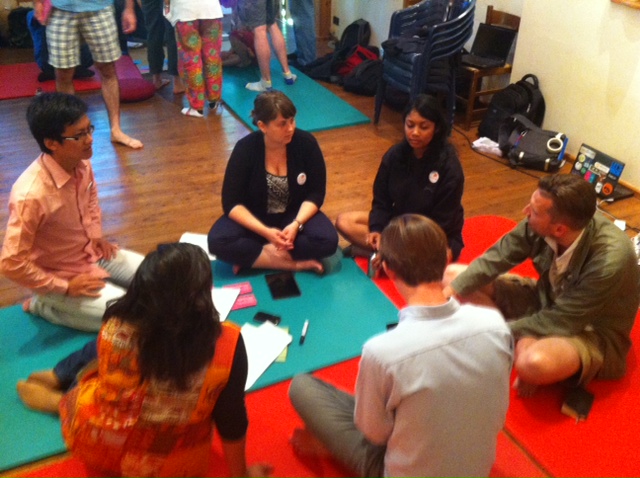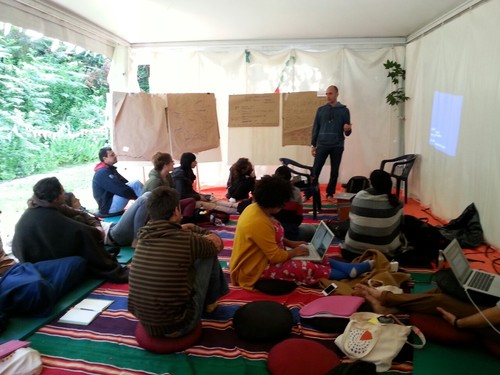Track summaries
The morning tracks were two-hour long daily sessions on four inter-related approaches to working with information for advocacy: Investigation, Documentation, Curation and Intervention. They laid down the building blocks for working with evidence for influence, giving advice on strategy, sharing participant experiences and developing new approaches together. Each participants chose to attend one track throughout the week.
CURATION
Facilitators:
Stephanie Hankey, Rahul Bhargava, Tin Geber

How do we use data to change hearts and minds?
The Curation track was about gathering data and creating stories -- how to find data, understand it, get to know it inside out, and then produce something imaginative that will get people to sit up and pay attention. This can take the form of maps, visualisations, case studies, papers, or even artwork.
Using a dataset on land grabbing as a basis, the track talked about different ways of approaching the data we have. How do we find stories in data? The group looked at how to recognise patterns; identify outliers and exceptions; and find juxtapositions and correlations.
The track also discussed how we can find more data for our stories. 'Shopping for data', for example, starts by gathering data from traditional sources; then once the key details are clear, we can get creative and 'shop around' at other outlets, mixing and matching different types of data to tell more holistic, more interesting stories.
The track also covered security issues: how to clear metadata, for example, and what information we are revealing every time we post a tweet. Lastly (but importantly), we discussed credibility and reliability, and the ethics of what we are doing and how. A strong group of inspired curators emerged, ready to tell stories that will have an impact.
INVESTIGATION
Facilitators:
Paul Radu, Lydia Medland, Smari McCarthy, Sami Ben Gharbeia, Eliot Higgins
Activists and advocates are often detectives, working against criminal, corporate and governmental abuses of power. But to do the work of detectives we need investigative skills.
The Investigation track broke down and studied the fundamentals of a bare-bones investigative process. In the sessions, campers put themselves in the shoes of their nemeses and then began the process of understanding investigation; how to drill down and find information and how to put the puzzle together, while -- crucially -- keeping safe in the process.
Using inspiring case studies and first-hand accounts based on the track facilitators' own experiences (exposing Syrian arms trafficking; tracking organised crime across borders in Eastern Europe), the group looked at how to undertake their own investigations. Campers explored some of the different investigative tools available, both online and offline -- tools like Open Corporates and the Investigative Dashboard -- and applied what they learnt to real 'live' projects being worked on by people within the group.
The group came out with some shiny new detective skills, and a deeper understanding of the investigative process.
DOCUMENTATION
Facilitators:
Tom Longley, Chris Wilson, Lobna Darwish 
Supported by Vannak Lach, Ozlem Kaya. Niccolo Figa Talamanca and Alison Smith
What does documentation mean in an era of drones, constant surveillance, petabytes of video, a billion hashtags, a million leaks and a guy throwing a shoe at the US president? In advocacy work, documentation is key.
The Documentation track asked hard questions: How do we record it so it won't disappear? How do we collect it so they can't deny it? How do we use it so things can get better? Good documentation is the well kept memory which makes campaigning credible. It is a spare brain because we are collectively forgetful. It shows us what has happened and is now happening to us.
The track looked at how to find, collect, organise and secure documentation, from the oldest archive to the freshest hashtag. The sessions involved listening to each other's experiences and projects, as well as looking at other projects from around the world.
The track explored topics like methodology and planning in documentation projects through role plays involving overpriced 'beltway bandit' consultants and their clients. The group looked at success stories, identified common areas that contributed to this success, and discussed the lessons learned along the way.
Trust, listening and protection (of ourselves, as well as our sources) came up as key aspects of documentation, as well as, of course, careful consideration of ethical questions. Who owns the data? How are we going to use it? How do we ensure the well-being of the witness? The result was great discussions, inspiring projects and a new network of skilled documentation ninjas.
INTERVENTION
Facilitators:
Andrea Figari, Sasha Kinney, Jean Peters, Juan Casaneuva, Josh Begley, Jake Levitas, Supported by Gillo Cutrupi
The Intervention track, also called Beautiful Troublemakers, explored how to plan and win campaigns, motivate supporters and engage new audiences, using creative tactics to grab the spotlight and creative positive change. The group discussed how to focus demands, set a course for our campaigns and, crucially, decide which tactics are appropriate for achieving the changes we want to see.
Campers also shared their own examples of campaigns that have shaken up the status quo in inspiring and creative ways.
Within the track, the participants split into four groups and built campaigns around each group's chosen issue. Each group spent time defining the problem they wanted to tackle, identifying key decision-makers and other relevant actors, brainstorming tactics and finding ways to select the most fitting ones, and finally developing ways to understand how progress is made and victory achieved.
They then analysed their various audiences – allies, friends and neutral parties – and designed messages specifically for each audience. Different tactics were looked at, from attention-grabbing stunts like scaling the Shard in London to pouring pig blood in front of the Kenyan parliament.
A session on 'Why prism is awesome' got the groups to put themselves in their opponents' shoes, and think about how to use humour to make their message look ridiculous. Finally, participants looked at how to measure the success of a campaign.
The track combined practical cases studies with fun exercises and creative brainstorming, and left the group inspired and energized, with concrete examples and ideas to take back home and put into practice.

Evidence & Action

